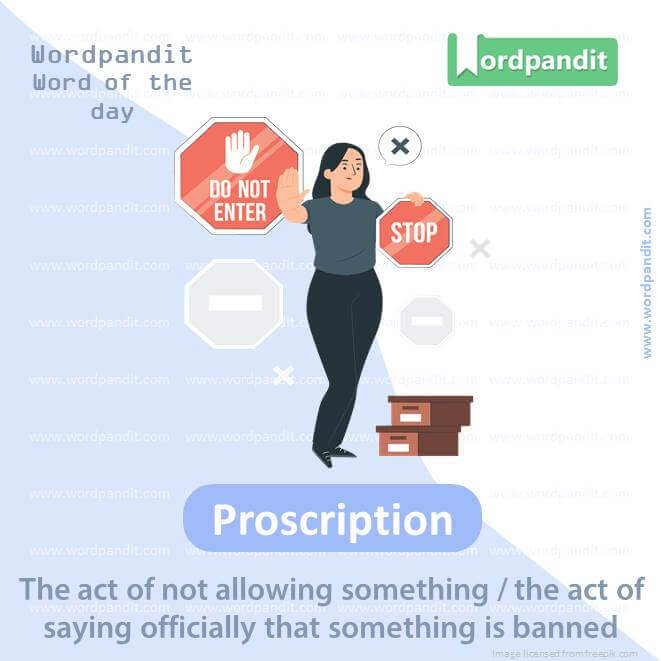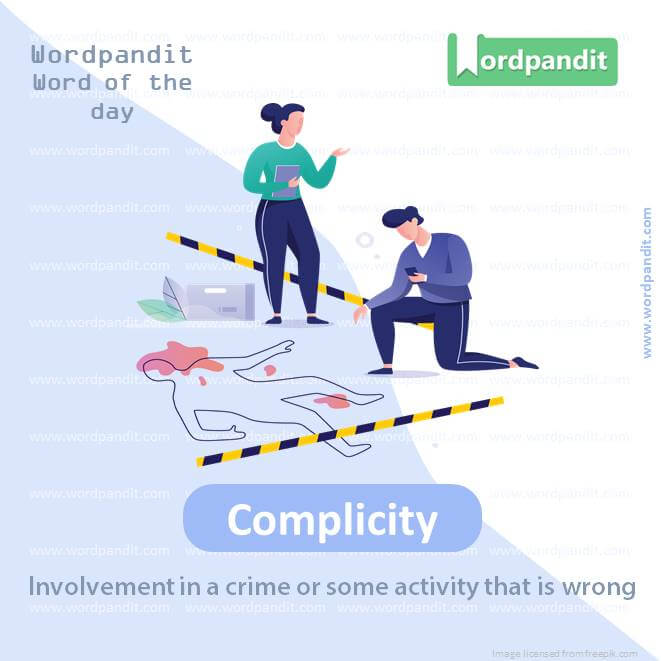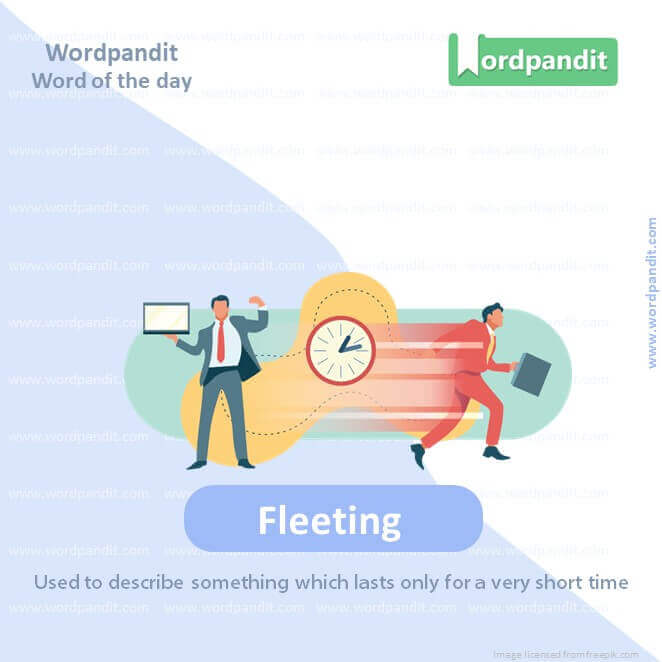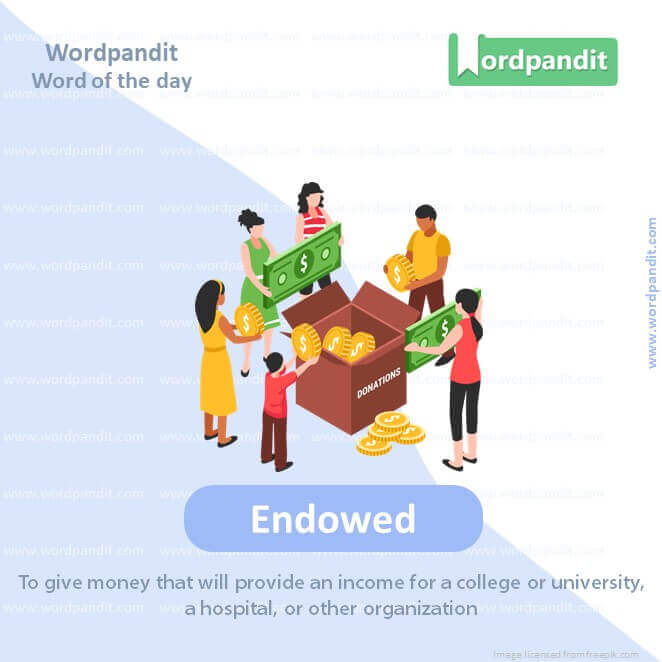Daily Vocabulary Words: List of Daily Used Words in Leading Indian Newspapers
Hi there. Welcome to this special section @ Wordpandit. Our endeavour here is straightforward: highlighting daily vocabulary words that you would come across in leading newspapers in the country. We have included the following newspapers in our selection:
• The Times of India
• The Economic Times
• Hindustan Times
• Mint
• Indian Express
We are putting in extensive work to develop your vocabulary. All you have to do is be regular with this section and check out this post daily. This is your repository of commonly used words; essentially, we are posting a list of daily used words. Hence, this has significant practical application as it teaches you words that are commonly used in leading publications mentioned above.
Visit the website daily to learn words from leading Indian newspapers.

WORD-1: PROSCRIPTION
CONTEXT: “The proscription of certain chemicals in the manufacturing industry was met with mixed reactions from stakeholders, leading to a rigorous debate in the parliament.”
SOURCE: The Economic Times.
EXPLANATORY PARAGRAPH: Proscription means when something is not allowed or forbidden. Imagine you have a favorite toy, but your parents say you can’t play with it today because it’s bedtime. That’s like a proscription for your toy, meaning it’s not allowed right now.
MEANING: The act of not allowing something / the act of saying officially that something is banned (verb).
PRONUNCIATION: pruh-skrip-shun
SYNONYMS: Ban, prohibition, restriction, taboo, interdiction, embargo, exclusion.
USAGE EXAMPLES:
1. The sign on the door had a proscription that said, “No Entry.”
2. Mom’s proscription against eating candy before dinner was very strict.
3. The school had a proscription on running in the hallways.
4. In some countries, there is a proscription against hunting certain animals.

WORD-2: COMPLICITY
CONTEXT: “The investigative report uncovered evidence of complicity among high-ranking officials, revealing a web of corruption that reached the highest levels of government.”
SOURCE: The Washington Post
EXPLANATORY PARAGRAPH: Complicity is when you do something wrong with someone else. It’s like when you and your friend secretly eat cookies before dinner, even though you’re not supposed to. You both did it together, so you’re both in trouble. That’s what complicity means, doing something naughty together.
MEANING: Involvement in a crime or some activity that is wrong (noun).
PRONUNCIATION: kuhm-PLIS-uh-tee
SYNONYMS: Involvement, collusion, partnership, association, connivance, conspiracy, cooperation
USAGE EXAMPLE:
1. The two friends were caught in complicity when they both skipped school together.
2. The police suspected complicity among the employees in the theft of the valuable painting.
3. Jane felt guilty due to her complicity in cheating on the test with her classmates.
4. Complicity in the prank made everyone in the class share the consequences.
WORD-3: HOMILIES
CONTEXT: “The local priest’s Sunday homilies have become a source of inspiration and reflection for the tight-knit community.”
SOURCE: The Times of India.
EXPLANATORY PARAGRAPH: Homilies are like wise and helpful stories or talks that grown-ups give to teach important lessons. They’re kind of like bedtime stories, but they teach you how to be a good person.
MEANING: Short speeches or stories that teach a lesson or give advice (noun).
PRONUNCIATION: hah-muh-lees
SYNONYMS: Sermons, lectures, discourses, teachings, moral stories, talks, lessons.
USAGE EXAMPLES:
1. The priest delivered homilies at the church every Sunday.
2. Grandma often told us homilies about kindness and sharing.
3. The teacher shared homilies about hard work and determination with the students.
4. The book was filled with homilies that inspired readers to be better people.
WORD-4: FORSAKE
CONTEXT: “Many in the tech industry are choosing to forsake the comfort of urban hubs, instead opting for remote work from quieter, rural settings.”
SOURCE: Indian Express.
EXPLANATORY PARAGRAPH: Forsake means when someone leaves or abandons something or someone. It’s like if your favorite stuffed animal was left behind at the park, you would feel sad because you didn’t want to forsake it.
MEANING: To abandon or leave something or someone behind (verb).
PRONUNCIATION: for-sake
SYNONYMS: Desert, abandon, leave, neglect, renounce, discard, quit.
USAGE EXAMPLES:
1. He promised never to forsake his friends, no matter what.
2. The old, abandoned house looked like it had been forsaken for years.
3. She had to forsake her favorite hobby to focus on her studies.
4. The lost puppy was forsaken by its owner but found a new home.

WORD-5: BYZANTINE
CONTEXT: “Navigating the byzantine regulations and norms of international trade has become a challenge for emerging businesses.”
SOURCE: The Economic Times.
EXPLANATORY PARAGRAPH: Byzantine is a fancy word for something that’s really, really complicated, like a giant puzzle that’s hard to solve. It’s like trying to figure out a maze with lots of twists and turns.
MEANING: Complicated and difficult to understand / relating to, or characteristic of the ancient city of Byzantium (adjective).
PRONUNCIATION: biz-an-teen
SYNONYMS: Complex, convoluted, intricate, labyrinthine, elaborate, involved, intricate.
USAGE EXAMPLES:
1. The instructions for building the toy were so byzantine that Dad had a hard time putting it together.
2. The legal process can be byzantine, with lots of confusing rules and steps.
3. The maze in the garden was a byzantine puzzle that took hours to solve.
4. Solving the math problem felt like navigating a byzantine maze of numbers.
WORD-6: FIREBRAND
CONTEXT: “The firebrand leader’s speech at the rally galvanized the youth, sparking renewed interest in the political discourse.”
SOURCE: Hindustan Times.
EXPLANATORY PARAGRAPH: A firebrand is someone who’s very passionate and enthusiastic about something. They’re like a spark of energy that can inspire others and get things moving.
MEANING: A passionate and dynamic person who inspires action or change (noun).
PRONUNCIATION: fai-ur-brand
SYNONYMS: Enthusiast, motivator, instigator, agitator, provocateur, dynamo, go-getter.
USAGE EXAMPLES:
1. Martin Luther King Jr. was a firebrand who inspired people to fight for civil rights.
2. The coach was a firebrand on the field, motivating the team to give their best.
3. The young activist was a firebrand, leading protests for environmental change.
4. Her speech at the rally turned her into a firebrand for women’s rights.

WORD-7: FLEETING
CONTEXT: “The city’s fleeting moments of serenity during dawn are what many early risers cherish the most.”
SOURCE: The Times of India.
EXPLANATORY PARAGRAPH: Fleeting means something that doesn’t last very long, like a butterfly flying by in the blink of an eye. It’s here and gone so quickly that you might almost miss it.
MEANING: Used to describe something which lasts only for a very short time (adjective).
PRONUNCIATION: fleet-ing
SYNONYMS: Momentary, transient, brief, short, passing, temporary, ephemeral.
USAGE EXAMPLES:
1. The beautiful sunset was fleeting, disappearing behind the mountains in minutes.
2. Her happiness was only fleeting because it quickly turned to sadness.
3. The feeling of joy was fleeting but unforgettable.
4. The snowflakes were fleeting, melting as soon as they touched the ground.
WORD-8: METALLURGICAL
CONTEXT: “India’s metallurgical research has made significant advancements, leading to more efficient and sustainable production methods.”
SOURCE: Live Mint.
EXPLANATORY PARAGRAPH: Metallurgical is a big word that means anything related to metals, like how they’re made, shaped, or used. It’s like talking about how a blacksmith makes a sword from metal.
MEANING: Relating to metals or the science of working with metals (adjective).
PRONUNCIATION: meh-tuh-lur-ji-kul
SYNONYMS: Metallic, metalworking, metallurgic, alloy-related, metal-based, metallurgical.
USAGE EXAMPLES:
1. The metallurgical industry is important for making cars and buildings.
2. The engineer had expertise in metallurgical processes for creating strong materials.
3. The jewelry was made with careful metallurgical techniques to ensure quality.
4. They studied metallurgical science.

WORD-9: ENDOWED
CONTEXT: “The ancient temple, endowed with rich cultural artifacts and relics, attracts historians and tourists alike.”
SOURCE: Indian Express.
EXPLANATORY PARAGRAPH: When someone is endowed, it means they have a special gift or talent that makes them unique. It’s like having a superpower, but instead of flying or being super strong, your gift could be something like being an amazing artist or being really good at making people laugh.
MEANING: To give money that will provide an income for a college or university, a hospital, or other organization (adjective).
PRONUNCIATION: en-dohd
SYNONYMS: Talented, blessed, gifted, skilled, bestowed, graced, privileged.
USAGE EXAMPLES:
1. The young musician was endowed with an incredible singing voice.
2. She was endowed with the ability to solve difficult math problems easily.
3. The endowed artist’s paintings were in high demand.
4. His endowed sense of humor always brightened everyone’s day.
WORD-10: SWAMPED
CONTEXT: “With the release of the new policy, government offices are swamped with applications, underscoring the need for digital transformation.”
SOURCE: Hindustan Times.
EXPLANATORY PARAGRAPH: Being swamped means you have so much to do that it feels like you’re drowning in tasks. It’s like having a pile of toys to clean up, a big stack of homework, and a room to tidy all at the same time – it can be really overwhelming!
MEANING: Overwhelmed or extremely busy with too many things to do (adjective).
PRONUNCIATION: swahmpt
SYNONYMS: Overloaded, inundated, snowed under, buried, overwhelmed, flooded, inundated.
USAGE EXAMPLES:
1. Mom felt swamped with housework after a busy week at work.
2. The students were swamped with assignments and exams during finals week.
3. The restaurant staff was swamped with orders during lunchtime.
4. He was swamped with emails and couldn’t respond to them all in one day.
Vocabulary Meaning and Examples
Immerse yourself in the exciting world of ‘vocabulary meaning and examples’. This concept refers to learning new words, comprehending their meanings, and understanding their usage through real-world examples. Indeed, the ‘vocabulary meaning and examples’ approach can significantly enhance a learner’s language command.
Embarking on the ‘vocabulary meaning and examples’ journey involves starting with a curated list of words. Once you understand a word’s meaning, scour for examples conjuring this word in different contexts. This approach to encompass ‘vocabulary meaning and examples’ allows you to visualize the word’s utility and familiarizes you with its practical usage.
An effective way to learn ‘vocabulary meaning and examples’ is through extensive reading. Reading a variety of materials naturally exposes you to diverse vocabulary implemented in various contexts, helping you gain understanding from real-life examples. Through this method, you interact with both the vocabulary meaning and examples organically, which can boost recognition and recall.
Going beyond passive learning, active usage is essential in mastering ‘vocabulary meaning and examples’. Regularly formulating sentences using the new words reinforces their meaning and provides practical examples which can aid in remembering their usage.
Further, leveraging technology like language learning apps or online language courses can be a significant boon in learning ‘vocabulary meaning and examples’. These platforms usually provide new words, their meanings, and examples on a daily basis, supporting your voyage through language acquisition.
Ultimately, learning ‘vocabulary meaning and examples’ should be a part of your regular routine. A crafted blend of new words, understanding their connotations, exposure through reading and active use can result in an effective approach to mastering ‘vocabulary meaning and examples’, enriching your language proficiency and fluency.













